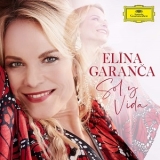 Garanca Sol y Vida; Lara: Granada; Traditional: La llorona; Vai lavar a cara; Sandoval: Gracias a la vida; Grieg: T'estimo; Cardillo: Core 'ngrato; Curtis: Torna a Surriento; Non ti scordar ti me; Voce'e sola; Chichon: Musica proibita; El dia que me quieras; Tosti: Non t'amo piu; Marechiare; Piazzolla: Yo sy Maria aus Maria de Buenos Aires; Hermida: Lela; Sorozabal: No puede ser aus La Taberna del Puerto; Barroso: Brazil; Elina Garanca, Mezzosopran, Orquesta Filarmonica de Gran Canaria, Karel Mark Chichon; Aufnahme 2018, Veröffentlichung 05/2019 (65'39) -Rezension von Remy Franck
Garanca Sol y Vida; Lara: Granada; Traditional: La llorona; Vai lavar a cara; Sandoval: Gracias a la vida; Grieg: T'estimo; Cardillo: Core 'ngrato; Curtis: Torna a Surriento; Non ti scordar ti me; Voce'e sola; Chichon: Musica proibita; El dia que me quieras; Tosti: Non t'amo piu; Marechiare; Piazzolla: Yo sy Maria aus Maria de Buenos Aires; Hermida: Lela; Sorozabal: No puede ser aus La Taberna del Puerto; Barroso: Brazil; Elina Garanca, Mezzosopran, Orquesta Filarmonica de Gran Canaria, Karel Mark Chichon; Aufnahme 2018, Veröffentlichung 05/2019 (65'39) -Rezension von Remy Franck

Die lettische Mezzosopranistin Elina Garanca singt auf dieser CD ein Repertoire, das zu den großen Hits von Tenören wie Caruso, Pavarotti, Domingo oder Carreras gehörte. Für den Hörer bedingt das eine Umstellung von Hörgewohnheiten, nicht zuletzt weil viele Texte sich von Mann an Frau richten und sie sich einem so stark richtungsgebunden eingeprägt haben, dass es einem schwer fällt, sich umzustellen, insbesondere wenn der Text, wie bei Lara’s Granada, von zu küssenden roten Lippen handelt.
Es fällt entsprechend schwer, Elina Garanca das abzukaufen, was sie singt. Vieles klingt im Kontext einfach falsch und entspricht nicht dem Geist und dem Charakter von Text und Musik. Und so manche Kanzone, die bei Caruso oder seinen Kollegen eine Kanzone blieb, wirkt hier zu opernhaft.
Rein vokal gesehen, singt die Garanca freilich grandios. Ihre Stimme ist weit gestreckt und überzeugt mehr durch Stimmpracht und große vokale Geste als durch die Beseeltheit, durch Gesangskunst mehr als durch den Charme, den andere in diesen Stücken so überzeugend kredenzt haben.
Latvian mezzo-soprano Elina Garanca sings on this CD a repertoire that belonged to tenors like Caruso, Pavarotti, Domingo or Carreras. For the listener, this means a change in listening habits, not least because many texts are directed from man to woman and they have become so strongly directional that it is difficult to change one’s mind, especially when the text, as in Lara’s Granada, is about red lips to be kissed. Many things simply sound wrong in context and do not correspond to the spirit and the character of text and music. And many a canzone, which remained a canzone with Caruso or his colleagues, is too operatic here. From a purely vocal perspective, Garanca’s singing is impressive. Her voice is stretched far and wide and convinces more through vocal splendour and great vocal gesture than through soulfulness, more through vocal art than through the charm that others have so convincingly presented in these pieces.
























